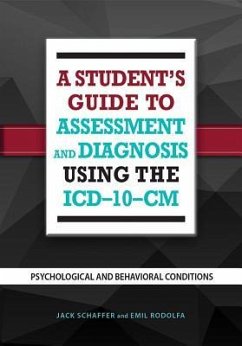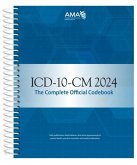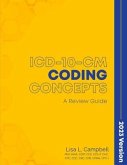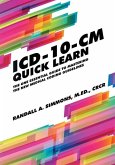Jack B Schaffer, Emil R Rodolfa
A Student's Guide to Assessment and Diagnosis Using the ICD-10-CM
Psychological and Behavioral Conditions
Jack B Schaffer, Emil R Rodolfa
A Student's Guide to Assessment and Diagnosis Using the ICD-10-CM
Psychological and Behavioral Conditions
- Broschiertes Buch
- Merkliste
- Auf die Merkliste
- Bewerten Bewerten
- Teilen
- Produkt teilen
- Produkterinnerung
- Produkterinnerung
In the United States, psychologists are in the process of adapting to the World Health Organization's International Classification of Diseases (ICD). This easy-to-read guide - optimized for implementation in the classroom - teaches students a straightforward conceptual framework for assessment and diagnosis with the ICD-10-CM as its foundation.
Andere Kunden interessierten sich auch für
![ICD-10-CM 2024 the Complete Official Codebook ICD-10-CM 2024 the Complete Official Codebook]() American Medical AssociationICD-10-CM 2024 the Complete Official Codebook103,99 €
American Medical AssociationICD-10-CM 2024 the Complete Official Codebook103,99 €![ICD-10-CM Coding Concepts - A Review Guide 2023 Version ICD-10-CM Coding Concepts - A Review Guide 2023 Version]() Lisa L. CampbellICD-10-CM Coding Concepts - A Review Guide 2023 Version79,99 €
Lisa L. CampbellICD-10-CM Coding Concepts - A Review Guide 2023 Version79,99 €![ICD-10-CM Abridged, Diagnostic Coding in Obstetrics and Gynecology, 2020 ICD-10-CM Abridged, Diagnostic Coding in Obstetrics and Gynecology, 2020]() American College of Obstetricians and GynecologistsICD-10-CM Abridged, Diagnostic Coding in Obstetrics and Gynecology, 202028,99 €
American College of Obstetricians and GynecologistsICD-10-CM Abridged, Diagnostic Coding in Obstetrics and Gynecology, 202028,99 €![ICD-10-CM Quick Learn ICD-10-CM Quick Learn]() Randall A SimmonsICD-10-CM Quick Learn42,99 €
Randall A SimmonsICD-10-CM Quick Learn42,99 €![The Student's Guide to Clinical Medicine and Case-Taking The Student's Guide to Clinical Medicine and Case-Taking]() Francis WarnerThe Student's Guide to Clinical Medicine and Case-Taking22,99 €
Francis WarnerThe Student's Guide to Clinical Medicine and Case-Taking22,99 €![Combating Emerging Infectious Diseases Using the Financial Action Task Force National Risk Assessment Strategy Combating Emerging Infectious Diseases Using the Financial Action Task Force National Risk Assessment Strategy]() Angela Eiterhebhe EsoimemeCombating Emerging Infectious Diseases Using the Financial Action Task Force National Risk Assessment Strategy40,99 €
Angela Eiterhebhe EsoimemeCombating Emerging Infectious Diseases Using the Financial Action Task Force National Risk Assessment Strategy40,99 €![The Student's Guide to Medical Case-Taking The Student's Guide to Medical Case-Taking]() Francis WarnerThe Student's Guide to Medical Case-Taking19,99 €
Francis WarnerThe Student's Guide to Medical Case-Taking19,99 €-
-
-
In the United States, psychologists are in the process of adapting to the World Health Organization's International Classification of Diseases (ICD). This easy-to-read guide - optimized for implementation in the classroom - teaches students a straightforward conceptual framework for assessment and diagnosis with the ICD-10-CM as its foundation.
Produktdetails
- Produktdetails
- Verlag: American Psychological Association (APA)
- Seitenzahl: 225
- Erscheinungstermin: 16. November 2015
- Englisch
- Abmessung: 256mm x 177mm x 15mm
- Gewicht: 436g
- ISBN-13: 9781433820939
- ISBN-10: 1433820935
- Artikelnr.: 43775555
- Herstellerkennzeichnung
- Libri GmbH
- Europaallee 1
- 36244 Bad Hersfeld
- gpsr@libri.de
- Verlag: American Psychological Association (APA)
- Seitenzahl: 225
- Erscheinungstermin: 16. November 2015
- Englisch
- Abmessung: 256mm x 177mm x 15mm
- Gewicht: 436g
- ISBN-13: 9781433820939
- ISBN-10: 1433820935
- Artikelnr.: 43775555
- Herstellerkennzeichnung
- Libri GmbH
- Europaallee 1
- 36244 Bad Hersfeld
- gpsr@libri.de
Jack Schaffer, PhD, spent 17 years in independent practice and 16 years as faculty in two medical schools and a professional school. His private practice specialized in clinical and neuropsychological assessments and psychotherapy with adults and families. He received his doctorate in clinical psychology from The University of North Dakota and is certified by the American Board of Professional Psychology in clinical psychology and clinical health psychology. He is a fellow and past president of the Association of State and Provincial Psychology Boards and a past chair of the State of Minnesota Board of Psychology. He currently serves on APA's Commission on Accreditation. Dr. Schaffer's professional interests include psychological assessment, defining and assessing professional competence, and ethical and legal issues. He enjoys woodworking, bicycling, and spending time with his wife, his two children, and four grandchildren. Emil Rodolfa, PhD, is a professor of psychology at Alliant International University's California School of Professional Psychology (CSPP) in Sacramento. He received his doctorate from Texas A&M University and was training director and director of the University of California Counseling and Psychological Services prior to joining the faculty at CSPP. He is the founding editor of Training and Education in Professional Psychology and was Associate Editor of Professional Psychology: Research and Practice. Dr. Rodolfa is a fellow of APA, a fellow and past president of the Association of State and Provincial Psychology Boards, a Board Member Emeritus and past chair of the Association of Psychology Postdoctoral and Internship Centers, and a past president of the State of California Board of Psychology. His professional interests include defining and assessing professional competence, ethical and legal issues, supervision and training, college student mental health, and the assessment and treatment of anxiety and depression. He enjoys spending time with his family, playing horseshoes and BBQing (some might call it grilling) at his cabin in the mountains.
Acknowledgments
Introduction
1. The ICD–10: A Primer
2. Psychological Assessment: The Foundation for Diagnosis
3. Conducting an Assessment and Making a Diagnosis
4. Using the ICD–10–CM: Case 1 — Lynn
5. Using the ICD–10–CM: Case 2 — John Smith
6. Using the ICD–10–CM: Case 3 — Anne Sanchez
7. Ethics of Assessment — Protecting Your Patients
8. Risk Management — Protecting Your Patients and Yourself
9. Disposition — The Assessment Is Done, What's Next?
10. Resources — To Prepare for the Work of a Psychologist
Appendix A: Interview Protocol
Appendix B: Relevant Forms
References
Index
About the Authors
Introduction
1. The ICD–10: A Primer
2. Psychological Assessment: The Foundation for Diagnosis
3. Conducting an Assessment and Making a Diagnosis
4. Using the ICD–10–CM: Case 1 — Lynn
5. Using the ICD–10–CM: Case 2 — John Smith
6. Using the ICD–10–CM: Case 3 — Anne Sanchez
7. Ethics of Assessment — Protecting Your Patients
8. Risk Management — Protecting Your Patients and Yourself
9. Disposition — The Assessment Is Done, What's Next?
10. Resources — To Prepare for the Work of a Psychologist
Appendix A: Interview Protocol
Appendix B: Relevant Forms
References
Index
About the Authors
Acknowledgments
Introduction
1. The ICD–10: A Primer
2. Psychological Assessment: The Foundation for Diagnosis
3. Conducting an Assessment and Making a Diagnosis
4. Using the ICD–10–CM: Case 1 — Lynn
5. Using the ICD–10–CM: Case 2 — John Smith
6. Using the ICD–10–CM: Case 3 — Anne Sanchez
7. Ethics of Assessment — Protecting Your Patients
8. Risk Management — Protecting Your Patients and Yourself
9. Disposition — The Assessment Is Done, What's Next?
10. Resources — To Prepare for the Work of a Psychologist
Appendix A: Interview Protocol
Appendix B: Relevant Forms
References
Index
About the Authors
Introduction
1. The ICD–10: A Primer
2. Psychological Assessment: The Foundation for Diagnosis
3. Conducting an Assessment and Making a Diagnosis
4. Using the ICD–10–CM: Case 1 — Lynn
5. Using the ICD–10–CM: Case 2 — John Smith
6. Using the ICD–10–CM: Case 3 — Anne Sanchez
7. Ethics of Assessment — Protecting Your Patients
8. Risk Management — Protecting Your Patients and Yourself
9. Disposition — The Assessment Is Done, What's Next?
10. Resources — To Prepare for the Work of a Psychologist
Appendix A: Interview Protocol
Appendix B: Relevant Forms
References
Index
About the Authors








